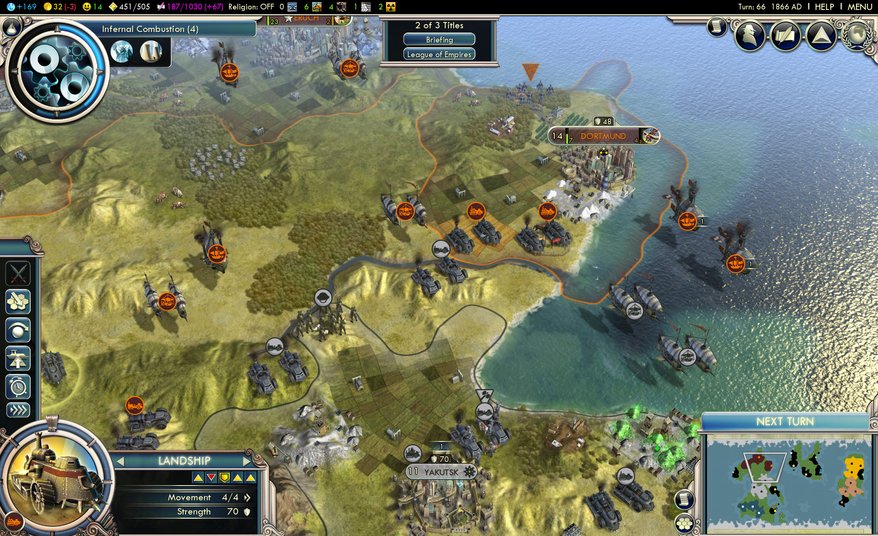Civilization V: Gods & Kings hands-on - religion, espionage, and steampunk

The Civilization V Gods & Kings expansion adds religion to the early game, espionage to the mid and late game, and a steampunk campaign somewhere around the time Queen Victoria was having tea with Alan Turing on an airship. I played with all three of its primary features -- here's what you need to know.
How Religion works
1. It starts with Faith , a resource like Gold and Culture, which can be cultivated with buildings and Social Policies. When you've earned enough, you can found a Pantheon and choose your first Belief. When a Belief is claimed, it's off the table for other civs. Do you want faster border growth? +1 Faith from desert tiles? +1 Culture from pastures? There's a huge list of choices.
2. When a Great Prophet is born , you can establish your proper religion. I chose Zoroastrianism, but the religion names are just flavor, and don't affect which Beliefs can be chosen.
3. By consuming a Great Prophet and founding a religion , you're awarded two new Beliefs on top of your original Pantheon Belief. The first is a Founder Belief, which gives you a bonus for every follower, and the second is a Follower Belief, which benefits the cities of followers, even if they're not yours.
4. The final step is to spread your religion. Missionaries purchased with Faith can be sent to cities to spread the good word. Not every civilization will appreciate your spiritual conquest, but some will welcome it. Cities containing religious followers will also exert pressure on neighboring cities, allowing passive transfer of beliefs.
What I think so far
To those (myself included) who complained that Civilization V lacks the strategic depth of Civ IV, and lamented the loss of religion and espionage in favor of Social Policies and city-states, the religion system in Gods & Kings says, “Oh, you want more detail do you? HERE'S ALL OF IT!”
I spent a long time scrolling up and down through the list of Beliefs before settling on my first -- there are a lot of options to weigh. But they're not arbitrary: each Belief is tailored to one of Civ's win strategies, and I like that many are related to geography. Earning bonuses for worshiping tree and sea gods on my civ's forested island helped construct a more interesting narrative.
The biggest gaming news, reviews and hardware deals
Keep up to date with the most important stories and the best deals, as picked by the PC Gamer team.
The new resource and specialty units also add a lot of decision making to the early game. Religion can be used relatively passively, but if you want to wage holy wars, you'll have to make it one of your priorities and reduce progress in another area. Since I wasn't in a resource-heavy area, I focused on Beliefs which increase happiness to keep my citizens from becoming frowny-faces over the lack of luxuries. I spread it to a couple cities in a neighboring civ, but after that, I let it do its thing mostly unchecked. I worried that too much focus on faith and followers might not pay off, so by the time I reached the Renaissance I'd largely abandoned my spiritual ambitions.
I didn't feel compelled to treat Religion as more than passive bonuses and story flavor, but I can see its potential to become a major component of pre-industrial strategy.

How Espionage works
1. When you reach the Renaissance , the strategic importance of religion takes a backseat to spies. From the espionage menu, you can manage your first covert operative. He isn't a unit on the map -- all espionage actions occur in the menu. Your first step is to send him to a foreign city to set up reconnaissance, which takes several turns.
2. Once embedded in a city , your spy can steal technology and information, and you can peek at your opponent's city management screen. If you want to be really devious, you can stage coups in city-states.
3. The Intrigue system allows you to peek at what the AI is planning -- who they're plotting against and what they're building.
4. Spies stationed in your own cities perform counter-intelligence and can kill enemy spies.
What I think so far
I've only played through one scenario with espionage, but I think I may be in love. Espionage in Gods & Kings adds strategic depth without being a managerial burden, and unlike the religion system, which primarily introduces new strategic choices, it helps you make those choices intelligently.
When I discovered that the leader of a neighboring civilization was plotting against me, I used two Great Generals to build forts along my border and stationed a line of defensive units. I also built an army deep within my borders and secretly constructed a railroad that allowed me to rapidly flank one of his vulnerable cities. By the time he declared war, I was in a position to make it hurt. The intel my spy recovered changed the outcome of battles and made me feel like a more powerful and competent leader, which is the feeling I play Civ for.

Empires of the Smoky Skies scenario
The core game additions are Gods & Kings' main course, but its alternate history scenario, Empires of the Smoky Skies, is a surprisingly elaborate dessert. Like with molded chocolate shapes and everything. It features new leaders, units, strategic resources, research options, and victory conditions, each slathered thick with rivets, goggles, and coal.
That's an impressive amount of stuff for one custom scenario, and it takes adjusting to. Before I became familiar with the five new bespectacled leaders and their industrious civilizations, I kept mixing them up and accidentally talking to the wrong guy. Hi, would you like to go to war with Ignace Curnow of Orlin? What's that? You ARE Ignace Curnow of Orlin? Well, this is most embarrassing.
The scenario opens at the onset of the Steam Era, where the tech tree diverges from the vanilla game's. Eruptives, Landships, Sky Fortress, Galvanomagnetism, and Subterranean Exploration are among the scientific discoveries researched on the way to The Future Era. The special units are very standard steampunk stuff -- giant armored landships and blimp-like air fortresses -- but the fiction is well-crafted and intentionally whimsical. I love that "Aetherium" makes things fly, and that I can consult the "League of Empires" and imagine men with mustaches and cigars convening in the elaborate parlor of a floating city.
To win, a civilization must lead in three out of five areas for at least five turns. Wealth, progress, and social policies all demand attention, because excelling in only one won't secure a victory. Of course, you could just conquer the entire map, but that's not very nice, is it? A better choice is to focus on spying. Religion is disabled in the scenario, but espionage is immediately integral to success -- especially for stealing technology and discovering which Wonders are under construction. As espionage is currently my favorite part of Gods & Kings, its importance in Smoky Skies makes the scenario even more fun for me. I plan to play it at least a few times.
Gods & Kings releases in North America on June 19, 2012 and internationally on June 22, 2012, at which point we'll have a proper verdict. In the meantime, you can read up on some of the expansion's other tweaks in our GDC interview with Lead Designer Ed Beach .

Tyler grew up in Silicon Valley during the '80s and '90s, playing games like Zork and Arkanoid on early PCs. He was later captivated by Myst, SimCity, Civilization, Command & Conquer, all the shooters they call "boomer shooters" now, and PS1 classic Bushido Blade (that's right: he had Bleem!). Tyler joined PC Gamer in 2011, and today he's focused on the site's news coverage. His hobbies include amateur boxing and adding to his 1,200-plus hours in Rocket League.

